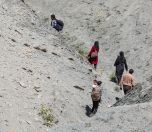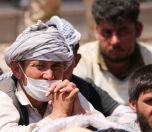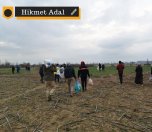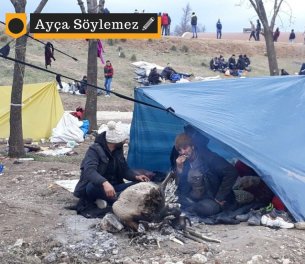Click to read the article in Turkish
As part of a research project carried out in March-December 2020, the Association for Migration Research (GAR) has released a new report titled "Ghosts of İstanbul: Afghans at the Margins of Precarity."
Published in English, the report examines various forms of precarious conditions of Afghan population that constantly proliferate both during their dangerous journeys as well as lives in İstanbul.
Supported by the Embassy of Switzerland in Turkey, the report is authored by Sibel Karadağ and coordinated by Didem Danış and Deniz Sert.
The study is based on 50 semi-structured, in-depth interviews conducted with Afghans in various İstanbul districts, namely Zeytinburnu, Esenyurt, Tuzla and Beykoz. İstanbul is selected as the main venue of research due to "its unique composition inhabiting the largest population of unregistered and undocumented Afghans working in the labor market."
'Not yet received the attention they deserve'
In introducing the report, the GAR notes that while Afghans represent the longest-displaced and dispossessed population in the world, they have not yet received the attention they deserve from the international community.
Amid this lack of attention, the report sets out to highlight a wider international infrastructure reproducing the precarity of Afghan population.
Accordingly, it first focuses on the steps of Afghans' journeys from Afghanistan on the way to İstanbul by portraying and visualizing their routes.
Then, the reproduction of precarity in İstanbul is scrutinized within the contexts of their bodily and ascetic labor force, invisible mobility, fear of deportation and abandonment by the regimes of international protection.
All in all, the report of the GAR association links the precarious conditions of Afghan population living in İstanbul to the wider historical, social, economic and political infrastructures of the region.
'Definition of refugee must be reconsidered'
The association also shares the following information about the case of Afghan people in the context of international asylum regime:
"The case of Afghans reveals the problems with the international asylum regime that has been generated in the post-WWII period. This longest-displaced population calls forth reconsideration in the very definition of a refugee in the 21st century. Fleeing from war, violence, mass killings, natural disasters, drought and floods, and extreme poverty, Afghans are still not taken into consideration in collective asylum cases.
"In today's world, the constructed categorical differentiation between an 'economic migrant' and a 'political asylum' is now proven to be obsolete and insufficient as it lays the ground for the material, institutional and ideological infrastructure of the long durée of precarity for Afghans."
'Precarity starts at their home country'
Before sharing a series of policy recommendations for the international community, authorities in Turkey and civil society, the GAR briefly reaches the following conclusions based on its study with Afghans:
"The precarity of the Afghan population starts at their home country and moves with Afghan bodies across countries and regions.
"Forced displacement due to numerous natural, economic and political factors is followed by weeks-long dangerous journeys during which they cross deadly mountains and deserts.
'Bodily labor as the one and only capital'
"The ones who survive this journey reach the Turkish border after which their predicament ensues in the hands of cruel market conditions.
"Indicating the unique characteristics of the city of İstanbul, the young, single, and undocumented Afghans constitute the bottom stratum within the informal labor force.
"Working under extremely cruel conditions, living a totally isolated and invisible life, earning money to remit back home to support their families as their resilient body allows them, and being completely abandoned by the international community and civil society, the Afghan population stands at the margins of precarity.
"Their bodily labor becomes the one and only capital they have. While the heaviest working conditions turn them into docile bodies, the legal precarity intimidates them with all-pervasive fear of deportation.
"Accordingly, they become subjected to extremely self-enclosed and invisible life within the hidden corners of İstanbul.
'Invisible in the eyes of international community'
"In addition to the invisibility enforced by their living conditions, Afghans are also invisible in the eyes of international community and civil society.
"Due to the structural, institutional and bureaucratic barriers in front of registration and access to international protection, Afghans in İstanbul are left with only one choice that is undocumented life.
"It concomitantly means being neglected by the scope of civil society whose aid or assistance becomes inaccessible.
"At this point, several grassroots initiatives fill this gap, albeit partially, by reaching out to these invisible lives despite their restricted budgets.
"On the other hand, Afghan associations utilize this lacuna by marketizing and monetizing the registration process.
'It might even intensify in the near future'
"All in all, besides some who capitalize on these precarious lives, the predicament of the majority increases.
"Within their highly isolated and stranded life, Afghans pursue practices of solidarity among themselves in Turkey and with the ones in Afghanistan by establishing long-distance networks ties.
"Lastly, the tragedy of Afghans is still far away from being acknowledged despite its four decades long history.
"In December 2020, a senior humanitarian affairs official of the United Nations (UN) announced right after his trip to Afghanistan that 16 million Afghans would need help in 2021 due to pandemic, increased conflict, and massive displacement.
"These indicate that the story of Afghans will continue and even intensify in the near future unless the international community takes the responsibility of providing legal and structural pathways."
About the GARGAR – Association for Migration Research was founded on September 21, 2017, with the aim of conducting research on migration, taking part in the multidisciplinary migration research, supporting migration research and migration researchers, contributing to the dissemination of knowledge produced in these researches, and enabling professional solidarity, communication, collaboration, and interaction among the migration scholars. We also aim at providing solutions to scientific, institutional, and ethical problems that the migration researchers face and raising public awareness regarding the problems un/documented migrants, asylum seekers, and refugees confront. Among the founding members of GAR are (alphabetical order by surname) Polat Alpman, Selin Altunkaynak, Didem Danış, Gülay Uğur Göksel, Biriz Karaçay, Deniz Sert and Besim Can Zırh. |
(SD)
* Click here for the full report




.jpg)




